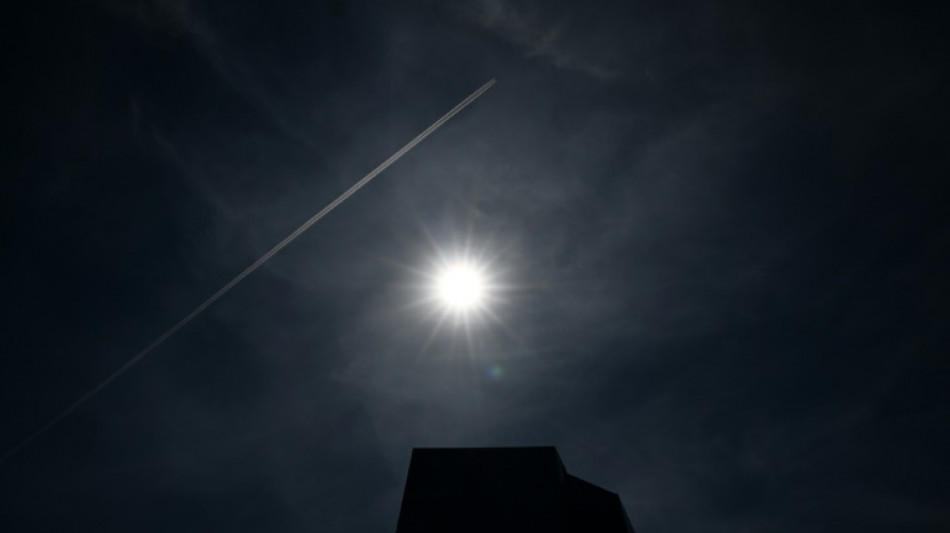
-
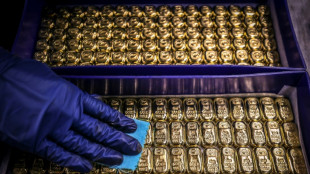 Gold hits record, dollar drops as tariff fears dampen sentiment
Gold hits record, dollar drops as tariff fears dampen sentiment
-
As Dalai Lama approaches 90, Tibetans weigh future

-
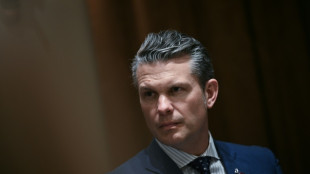 US defense chief shared sensitive information in second Signal chat: US media
US defense chief shared sensitive information in second Signal chat: US media
-
Swede Lingblad gets first win in just third LPGA start

-
 South Korea ex-president back in court for criminal trial
South Korea ex-president back in court for criminal trial
-
Thunder crush Grizzlies, Celtics and Cavs open NBA playoffs with wins

-
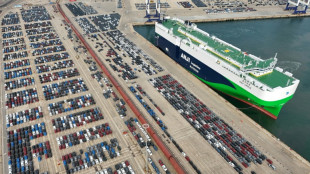 Beijing slams 'appeasement' of US in trade deals that hurt China
Beijing slams 'appeasement' of US in trade deals that hurt China
-
Trump in his own words: 100 days of quotes

-
 Padres say slugger Arraez 'stable' after scary collision
Padres say slugger Arraez 'stable' after scary collision
-
Trump tariffs stunt US toy imports as sellers play for time
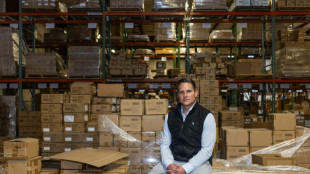
-
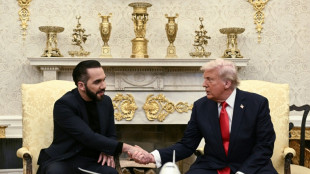 El Salvador offers to swap US deportees with Venezuela
El Salvador offers to swap US deportees with Venezuela
-
Higgo holds on for win after Dahmen's late collapse

-
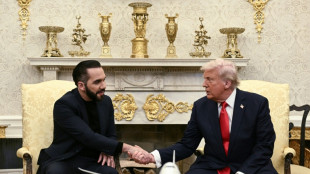 El Salvador's president proposes prisoner exchange with Venezuela
El Salvador's president proposes prisoner exchange with Venezuela
-
Gilgeous-Alexander, Jokic, Antetokounmpo named NBA MVP finalists

-
 Thomas ends long wait with playoff win over Novak
Thomas ends long wait with playoff win over Novak
-
Thunder rumble to record win over Grizzlies, Celtics top Magic in NBA playoff openers

-
 Linesman hit by projectile as Saint-Etienne edge toward safety
Linesman hit by projectile as Saint-Etienne edge toward safety
-
Mallia guides Toulouse to Top 14 win over Stade Francais

-
 Israel cancels visas for French lawmakers
Israel cancels visas for French lawmakers
-
Russia and Ukraine trade blame over Easter truce, as Trump predicts 'deal'

-
 Valverde stunner saves Real Madrid title hopes against Bilbao
Valverde stunner saves Real Madrid title hopes against Bilbao
-
Ligue 1 derby interrupted after assistant referee hit by projectile

-
 Leclerc bags Ferrari first podium of the year
Leclerc bags Ferrari first podium of the year
-
Afro-Brazilian carnival celebrates cultural kinship in Lagos

-
 Ligue 1 derby halted after assistant referee hit by projectile
Ligue 1 derby halted after assistant referee hit by projectile
-
Thunder rumble with record win over Memphis in playoff opener

-
 Leverkusen held at Pauli to put Bayern on cusp of title
Leverkusen held at Pauli to put Bayern on cusp of title
-
Israel says Gaza medics' killing a 'mistake,' to dismiss commander

-
 Piastri power rules in Saudi as Max pays the penalty
Piastri power rules in Saudi as Max pays the penalty
-
Leaders Inter level with Napoli after falling to late Orsolini stunner at Bologna

-
 David rediscovers teeth as Chevalier loses some in nervy Lille win
David rediscovers teeth as Chevalier loses some in nervy Lille win
-
Piastri wins Saudi Arabian Grand Prix, Verstappen second

-
 Kohli, Rohit star as Bengaluru and Mumbai win in IPL
Kohli, Rohit star as Bengaluru and Mumbai win in IPL
-
Guirassy helps Dortmund past Gladbach, putting top-four in sight

-
 Alexander-Arnold lauds 'special' Liverpool moments
Alexander-Arnold lauds 'special' Liverpool moments
-
Pina strikes twice as Barca rout Chelsea in Champions League semi

-
 Rohit, Suryakumar on song as Mumbai hammer Chennai in IPL
Rohit, Suryakumar on song as Mumbai hammer Chennai in IPL
-
Dortmund beat Gladbach to keep top-four hopes alive

-
 Leicester relegated from the Premier League as Liverpool close in on title
Leicester relegated from the Premier League as Liverpool close in on title
-
Alexander-Arnold fires Liverpool to brink of title, Leicester relegated

-
 Maresca leaves celebrations to players after Chelsea sink Fulham
Maresca leaves celebrations to players after Chelsea sink Fulham
-
Trump eyes gutting US diplomacy in Africa, cutting soft power: draft plan

-
 Turkey bans elective C-sections at private medical centres
Turkey bans elective C-sections at private medical centres
-
Lebanon army says 3 troops killed in munitions blast in south

-
 N.America moviegoers embrace 'Sinners' on Easter weekend
N.America moviegoers embrace 'Sinners' on Easter weekend
-
Man Utd 'lack a lot' admits Amorim after Wolves loss

-
 Arteta hopes Arsenal star Saka will be fit to face PSG
Arteta hopes Arsenal star Saka will be fit to face PSG
-
Ukrainian troops celebrate Easter as blasts punctuate Putin's truce

-
 Rune defeats Alcaraz to win Barcelona Open
Rune defeats Alcaraz to win Barcelona Open
-
Outsider Skjelmose in Amstel Gold heist ahead of Pogacar and Evenepoel


Plane contrails: white fluffy contributors to global warming
The white, feathery lines behind airplanes that look like bits of harmless cloud are anything but, warn experts, who say they could have a greater environmental impact than the aviation sector's CO2 emissions.
The condensation trails -- contrails, for short -- are being increasingly studied as scientists work with the industry to find technological solutions to the problem.
Classified as non-CO2 emissions from aircraft, in September they were the subject of a symposium in Montreal organized by the International Civil Aviation Organization, a UN agency.
- What are contrails? -
Contrails are clouds that form at high altitudes in cold, humid areas called ice supersaturated regions (ISSRs).
When jet fuel is burned by engines, water vapor condenses on to soot particles to form ice crystals.
Enough ice crystals, and they begin to form cirrus clouds -- high-altitude, wispy white filaments that, when created this way, trail out behind planes as they cross the sky.
These trails trap some of the heat that rises from the Earth at night, preventing it from radiating back out of the atmosphere -- thus acting as a greenhouse gas, causing warming, explains Donald Wuebbles, a professor at the University of Illinois.
Contrails that stay in the sky for a few minutes are not very worrisome, he says.
"But if they form at night, they'll maybe last a little longer, and at night they can cause a warming effect," he adds.
- What is the impact? -
Non-CO2 emissions could account for up to two-thirds of aviation's impact on global warming, which "gives you an idea of how important they are to consider," Wuebbles said.
And contrails could form up to 57 percent of that impact -- far more than the C02 emissions from burning fuel, according to a 2021 study.
However, such emissions are short-lived compared to carbon dioxide and their impact on global warming could be quickly eroded if solutions were found to avoid them, experts say.
- So what can be done? -
Not all flights create contrails -- it can depend on weather conditions and the aircraft's trajectory.
For example, at Air France, just four percent of flights are responsible for some 80 percent of the airline's contrail impact on global warming, notes Irene Boyer-Souchet, who is leading up the company's efforts to mitigate the damage.
The long-term strategy is to modify the trajectory of a fraction of flights.
Air France pilots made more than 3,000 observations over 18 months with the aim of helping Meteo-France improve its forecasts for at-risk areas so that pilots could eventually avoid them.
"The main risk is that by thinking you're avoiding an area, you could end up flying there because it's slightly off the weather forecast," Boyer-Souchet points out, illustrating the importance of fine-tuning the research.
Pilots from American Airlines conducted 70 test flights above or below at-risk areas, guided by satellite images, weather data, software models and AI prediction tools.
A 54-percent reduction in contrails was observed, along with a two-percent increase in fuel consumption.
Accelerating the deployment of a global contrail avoidance system could reduce aviation's impact on the climate by 40 percent, according to a Cambridge University report published in September.
The more flights in the air, however, the more complicated the implementation of such a system would be, notes Boyer-Souchet, who hopes that it will be a reality by 2030.
R.Buehler--VB



